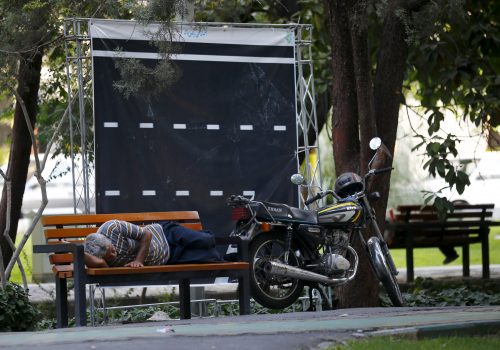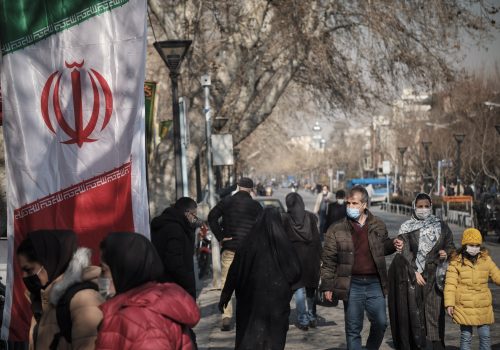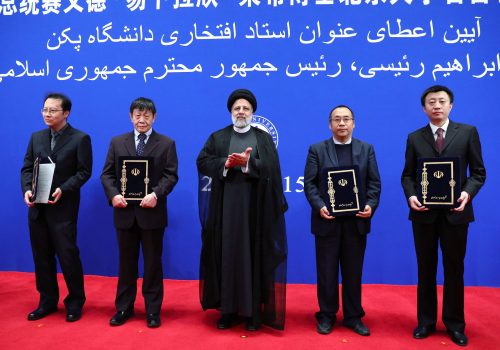Corruption reigns supreme in Iran—and it’s getting worse
Corruption has been a long-standing challenge in Iran. Iranians have generally blamed foreign powers as the source of corruption in their society. During the nineteenth and early twentieth-century Qajar period, they saw corruption as a byproduct of the Great Game rivalry between the British and Russians to exact favors from the royal court, famously described in Morgan Shuster’s Strangling of Persia. Russophiles and Anglophiles in high places are said to have competed to advance the interest of their patrons and were rewarded for their service. Thereafter and until the 1979 revolution, the culprits became the United States and capitalist imperialism.
Putting an end to foreign interests—as reflected in the slogan of esteghlal or “independence”—and creating a moral society were advocated as the primary motivations of the 1979 revolution. However, despite the dwindling foreign presence in the nascent Islamic Republic post-1979, which preached a more ethically centered society, corruption has reached new heights and has been ubiquitous from the first days of the regime. The ever-increasing amounts of money and elaborate schemes that routinely involve the closest regime insiders dwarf any pre-1979 reports of corruption.
So, just how bad is corruption in Iran today?
Corruption is a complex issue that exists in various forms and degrees in any society. It normally refers to the abuse of power for personal gains and the diversion of public resources for private use. As it is done behind closed doors, it is difficult to observe as it happens. Transparency International has developed the Corruption Perception Index (CPI), a widely used measure that is based on how experts and the private sector perceive corruption in the public sector. It draws on data collected by leading organizations through a range of regular surveys and assessments of different sectors of society, including politics, the economy, and the judiciary.
While even the best performer, Denmark, achieves only a score of ninety out of one hundred, Iran hovers around twenty-five, which ranks it as 147th out of 180 countries in 2022. Interestingly, its score improved between 2013-2017—when Iran became relatively more open to the outside world—but has sunk sharply since and not improved after hardliners consolidated their power and control over all branches of the regime—thus, validating the saying, “absolute power corrupts absolutely.”
Consensus exists among governance experts that opaque power structures, lack of transparency and accountability, and a weak rule of law are the primary causes of the persistence of corruption in any country. These conditions exist in Iran and have been exacerbated by the decades-long efforts to circumvent international sanctions, even though some steps have been taken to address corruption.
Most notably, Iran signed and ratified the United Nations’ Convention against Corruption. Additionally, high-profile public-sector bribery or fraud cases receive ample media coverage, ranging from vast embezzlement in state-controlled enterprises, such as the $21 billion fraud in Mobarakeh Steel Complex, the $3 billion in Sarmayeh Bank, or in the intricate web of bribery and fraud in the judiciary, as in the case of Akbar Tabari, the deputy to the long-time head of the Judiciary, Ayatollah Sadegh Larijani. These are just a few of the high-profile cases in recent years that have seen the light of day.
In one way or the other, all cases point to the prolific involvement of regime insiders. Some perpetrators have fled and now live comfortably in the West, like Bank Melli General Manager Mohammad Reza Khavari, who presumably embezzled $2.6 billion and reportedly lives in Canada. The perpetrators that were caught have received heavy sentences, while some were executed and others fled. In one instance, one faced a suspicious death in exile for fear of whistleblowing.
These cases have demonstrated the extent of power networks of patronage within the regime and its various factions, often linked to high-level clergy. The very big fish that were caught continue to benefit from protection—even inside prison. In late June, the head of Iran’s prisons revealed that, despite his thirty-one-year sentence, Tabari is no longer in prison and has been set free by the highest judicial authority.
Unfortunately, systemic corruption is likely to get worse. The fragility of the regime and the erosion of its supporters in the wake of the ongoing anti-establishment protests due to Mahsa Jina Amini’s murder, the shifting loyalties within the inner circles, and the uncertainty of the post-Ayatollah Ali Khamenei succession are among some of the factors that create an environment of instability in which those who have an opportunity to steal are likely to do so while they can.
Do sanctions promote corruption?
Some Iranians point fingers for the ever-deepening corruption at the layers and layers of economic sanctions that have been imposed on the country since 1979. Sanctions do create economic distortions that are meant to disrupt normal economic activity, mostly through blocking trade and financial channels. But according to Hashem Pesaran, a prominent Iranian economist, only 20 percent of the economic malaise over a thirty-year period was caused by sanctions, and eighty percent is due to domestic policies.
Nonetheless, efforts to bypass these barriers lead to the emergence of informal or black markets, where corruption can thrive as individuals seek alternative ways to bypass sanctions and obtain necessary goods or services. One such instance is the case of Babak Zanjani—a businessman who, with the consent of officials during the presidency of Mahmoud Ahmadinejad (2005-2013), was tasked to export Iranian oil by evading internationally imposed sanctions and, in the process, siphoned off vast amounts. When the winds of fortune turned, he was arrested for embezzlement. Though initially sentenced to death, he was commuted to a life sentence and there are reports that he had been quietly pardoned since.
There is considerable debate about the role and effectiveness of international sanctions. Corruption and sanctions were among the topics discussed during an Atlantic Council panel on June 13. There are two opposing views. Some believe that more sanctions are needed to force the Islamic Republic to adopt acceptable behavior, be it in the realm of a nuclear deal, regional relations, human rights, or even bring about regime change. Others contend that regime insiders only benefit from sanctions—that they actually welcome it—while ordinary Iranians bear the brunt. There is evidence that sanction-busting mafias, known as sanction traders, derail any agreement with the West that may lead to sanctions relief as this would erode their economic interests.
Countries that impose sanctions insist that they are targeted toward specific individuals and activities and will not impact average citizens, particularly in the areas of food and medicine. However, the anemic economy combined with the difficulty of repatriating Iran’s foreign exchange earnings has resulted in an ever-weakening rial and high inflation, which Iranians feel daily.
Nevertheless, while there is a plethora of stories on how sanctions hurt the people, there are also daily examples of how sanctions have had little impact on limiting the access of officials to Western luxury goods and lifestyles. Sightings of officials with expensive watches, the latest iPhones, and designer clothes have become routine and questioned in the media. Indeed, a recent report argues that Iranian decision-makers have successfully shielded themselves from the adverse effects of sanctions. In reality, sanctions largely impact those that do not influence the regime’s actions.
Iranians inside and outside the country have long complained that foreign powers are not serious or consistent in applying sanctions. On the one hand, the average Iranian cannot open bank accounts abroad, and often many who opened accounts decades ago were asked to close them for fear of violating sanctions rules. On the other hand, visible trades, such as luxury goods (like a fleet of Porsches or Maseratis) and their payments, slip safely through the sanctions’ walls, and access to them is used as a reward for loyalty to the regime.
The inconsistency leads to suspicions that, contrary to oft-stated objectives that sanctions are not designed to hurt the people of Iran, the West not only knows what it is doing, but is, in fact, a facilitator for the regime against the people, as evident when a German IT firm helped the regime filter and block Internet during the height of the ongoing protests. Recently, it was reported that the infamous Hossein-Ali Nayyeri, one of the four judges who executed several thousand political prisoners in 1988—known as the 1988 massacre—was being treated at a leading neurological center in Germany. It is unimaginable to contend that German officials were unaware of who he is or through what channels the payment was made to cover his exorbitant treatment costs. The United States and Europe must do a better job of walking the talk to ensure that their maximum pressure measures are indeed punishing the ones whose decisions have caused the state in which Iranians find themselves.
A common thread
The frequently publicized cases of bribery, embezzlement, or diversion of funds have become routine. Hence, only the ever-increasing amounts of money and elaborate schemes can temporarily attract people’s attention until the next outrageous corruption case emerges.
A common thread among these cases is their link to the vast politically and ideologically loyal networks of patronage and rent-seeking interests, often including prominent members of the clergy. It is yet another area that the Islamic Republic has failed in making good on its promise of establishing an ethical society. The presence of an elaborate sanctions scheme does not seem to deter these networks. In fact, they seem to thrive more from the resulting opaqueness while the public at large suffers the consequences.
There is a considerable consensus among Iranians inside and outside the country that the regime must be punished for its egregious human rights conduct. Sanctions seem to be the only instrument in the toolbox to bring about behavioral change within the mullahcracy. There is a widely held view that the actions of the US and other Western governments have blocked the access of average Iranians. Yet, the door remains wide open for regime insiders to travel freely, access their oft ill-gotten funds with ease, and whose children live comfortably in the West. Sanctions need to be better targeted and better enforced instead of the West looking the other way.
Nadereh Chamlou is a nonresident senior fellow at the Atlantic Council’s empowerME initiative and an international development advisor.
Further reading
Tue, Feb 1, 2022
Can President Ebrahim Raisi turn Iran’s economic Titanic around?
IranSource By Nadereh Chamlou
The Ebrahim Raisi team is seen as the weakest since the revolution, but one with the strongest links to the IRGC, and where allegiance trumps expertise.
Thu, Sep 15, 2022
Iran’s president let it slip that inflation is at least 60 percent. Here’s how it happened.
IranSource By
President Ebrahim Raisi is not known for making news in his comments to the press. But on August 28, Raisi accidentally did so when he spoke in detail about the Iranian economy.
Wed, Feb 22, 2023
Iran’s economic future is uncertain. It’s no surprise why Raisi visited China.
IranSource By Jonathan Fulton
From February 14-16, Iranian President Ebrahim Raisi was in Beijing for his first foreign trip of the year and the first official visit to China for an Iranian leader in twenty years.
Image: Two years after the COVID-19 outbreak in Iran, Bank Melli Iran (BMI) staff members at the BMI’s stand at the 26th International Oil, Gas, Refining and Petrochemical Exhibition in Tehran on May 13, 2022. (Photo by Morteza Nikoubazl/NurPhoto)


